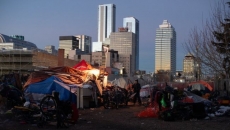A coalition of Canadian groups is raising the alarm about a shortfall in donations to help with Lebanon's humanitarian crisis, as Foreign Affairs Minister Mélanie Joly joined colleagues at a summit to try helping the country cope with the damage caused by Israeli airstrikes.
France hosted dozens of countries at the summit on Thursday, which it said had raised US$1 billion in pledges for Lebanon. A fifth of that is for the country's military while the rest is targeted at humanitarian aid.
Canada has already allocated just under $50 million in humanitarian aid to Lebanon this year, but Canadian charities say they're falling short of a goal set with Ottawa to match donations.
The federal government has pledged to double every dollar the Humanitarian Coalition raises until Nov. 3, to a maximum of $3 million. The funding goes to charities like Oxfam, Save the Children and World Vision to provide things like emergency shelter and medical support.
As of Thursday, the group had raised just $1.825 million of the $3 million Ottawa pledged to match two weeks ago.
The coalition's executive director Richard Morgan said a global focus on geopolitics of the war, instead of its resulting carnage, might be behind the slow uptake in donations.
"It's worrisome, to be honest," Morgan said. "It's, for example, at a much smaller pace compared to how Canadians rallied in 2020 after the blast in the Port of Beirut."
He fears there will be an outbreak of communicable diseases in cramped shelters that still need to be winterized. Morgan said donations help with everything from reuniting children and parents who have been separated to providing women with menstrual products. He said a $35 donation feeds a typical family for a week.
"As much as many Canadians are struggling with lots of issues here, I think many of us can afford to do something to help folks in their hour of need," he said.
Meanwhile, ministers gathered in Paris for a meeting under the theme of supporting Lebanon's people and sovereignty.
In addition to funding pledges, the summit's attendees discussed the need for Israel and Hezbollah to both respect a 2006 United Nations motion that called for an end to fighting, as well as boosting support for security in the country.
Israel has been striking apartment blocks and locations near hospitals, claiming they are targeting Hezbollah assets in an aim to stop the militant group's rockets.
Lebanese officials say the airstrikes have killed 2,500 people, and the UN says one million people have been displaced in Lebanon.
On Wednesday, the UN Development Programme released grim economic estimates for the country, where poverty had already tripled between 2012 and 2022.
The agency estimates the war could cut 9.2 per cent out of Lebanon's gross domestic product this yea. The country already has the highest per capita number of refugees of any state, ever since the Syrian civil war.
In Ottawa, bureaucrats warned MPs on Thursday that it will take years to restore the damage in Lebanon, the Gaza Strip and beyond.
"These are astronomical sums," Global Affairs Canada senior official Alexandre Lévêque told the House foreign affairs committee.
"The best thing the international community can do right now is to do everything in its power to put an end to the fighting, so that reconstruction can begin."






